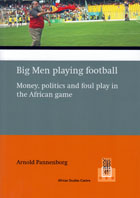Big Men playing Football. Money, politics and foul play in the African game
 Author: Arnold Pannenborg
Author: Arnold Pannenborg
While the skills of players can be observed on pitches throughout Africa, the actions of those who run the game’s administrative side are less visible. Based on anthropological fieldwork in Ghana and Cameroon, this study’s main characters are rich and powerful men who take up positions within clubs and football associations. Through their involvement in football, these African “Big Men” convert symbolic, social and economic capital. In other words, they transform the game’s popularity into status and prestige, political power and business opportunities. To this end, they maintain power within football administration through patronage politics. They also tend to resort to foul play. Match-fixing, juju, intimidation and age cheats are some of the methods these Big Men employ in order to achieve their goals.
On Friday 12 October, 10:15, Arnold Pannenborg will defend his PhD thesis entitled "Big men playing football. Money, politics and foul play in the African game", at the University of Tilburg.
Sport and religion in Africa: football between competition and ritual
The intention of this project is to investigate the interaction between the ideology and practice of sport and the ideology and practice of religion in the context of African football. Sport is perhaps the most successful of the projects of colonialism, in which Western norms and practices have been grafted onto a value system that in some respects is at odds with it. The study will examine how magical-religious practices in African football relate to the received ritual that is called football. This project will contribute to the growing theoretical discussion about the relation between religion and sport.
The combination between football and ritual will be studied in the Cameroons and Ghana, among other countries. These studies will include both national competitions as well as international events such as the African Nations Cup. Research methods will include participatory observation, depth interviews, interviews with key informants and secondary analysis of sports reportage and of the discourse in radio trottoir.

